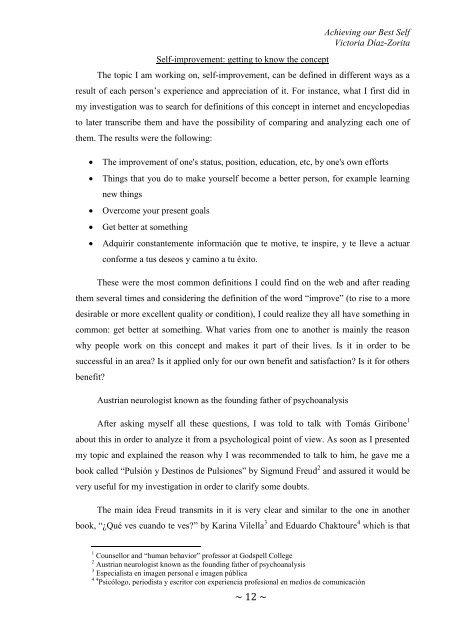You also want an ePaper? Increase the reach of your titles
YUMPU automatically turns print PDFs into web optimized ePapers that Google loves.
Self-improvement: getting to know the concept<br />
Achieving our Best Self<br />
Victoria Díaz-Zorita<br />
The topic I am working on, self-improvement, can be defined in different ways as a<br />
result of each person’s experience and appreciation of it. For instance, what I first did in<br />
my investigation was to search for definitions of this concept in internet and encyclopedias<br />
to later transcribe them and have the possibility of comparing and analyzing each one of<br />
them. The results were the following:<br />
<br />
<br />
<br />
<br />
<br />
The improvement of one's status, position, education, etc, by one's own efforts<br />
Things that you do to make yourself become a better person, for example learning<br />
new things<br />
Overcome your present goals<br />
Get better at something<br />
Adquirir constantemente información que te motive, te inspire, y te lleve a actuar<br />
conforme a tus deseos y camino a tu éxito.<br />
These were the most common definitions I could find on the web and after reading<br />
them several times and considering the definition of the word “improve” (to rise to a more<br />
desirable or more excellent quality or condition), I could realize they all have something in<br />
common: get better at something. What varies from one to another is mainly the reason<br />
why people work on this concept and makes it part of their lives. Is it in order to be<br />
successful in an area? Is it applied only for our own benefit and satisfaction? Is it for others<br />
benefit?<br />
Austrian neurologist known as the founding father of psychoanalysis<br />
After asking myself all these questions, I was told to talk with Tomás Giribone 1<br />
about this in order to analyze it from a psychological point of view. As soon as I presented<br />
my topic and explained the reason why I was recommended to talk to him, he gave me a<br />
book called “Pulsión y Destinos de Pulsiones” by Sigmund Freud 2 and assured it would be<br />
very useful for my investigation in order to clarify some doubts.<br />
The main idea Freud transmits in it is very clear and similar to the one in another<br />
book, “¿Qué ves cuando te ves?” by Karina Vilella 3 and Eduardo Chaktoure 4 which is that<br />
1 Counsellor and “human behavior” professor at Godspell College<br />
2 Austrian neurologist known as the founding father of psychoanalysis<br />
3 Especialista en imagen personal e imagen pública<br />
4 4 Psicólogo, periodista y escritor con experiencia profesional en medios de comunicación<br />
~ 12 ~






